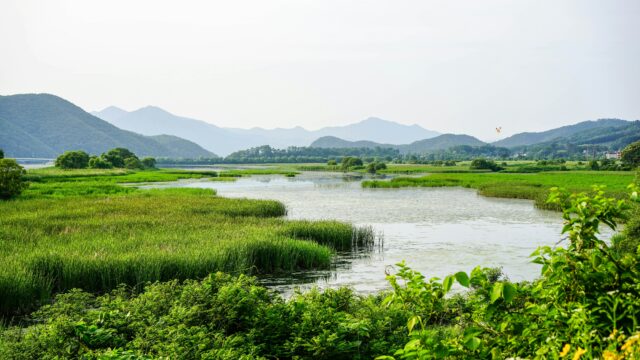Should nature have to prove its value?

Does putting a price tag on our natural world change our behaviour, or is it just another step into a model that brings few benefits for people - let alone our planet?
After reading my blog post 'The natural capital myth', the Green Economy Coalition invited me to write a piece on the ‘debates around valuing natural capital’. The request was to ‘use the article to present my solution for protecting and restoring our systems in the current economic paradigm, given the current rate of ecosystem degradation and the failings of sustainable development strategies in the last 30 years’. No small task in 700 words in two weeks!
Value to whom, or what?
I am very much for valuing ‘the natural’, which I understand as the organic and inorganic companions with whom we share Earth. There are two points of friction here for me, however. One is that for humans ‘the natural’ is always also ‘the social’. We can only approach ‘the natural’ through social categories, socialised practices and, indeed, myths. Our ‘socialising’ of ‘the natural’ has culminated in the geological epoch of the ‘Anthropocene’: ‘nature’ today is very much entangled with the modern industrial human. Plastics are found in the bodies of sperm whales, Pacific bluefin tuna in California contain radiation from Fukushima, and fossil fuel emissions appear to be forcing global climate change.
The second point of friction is that ‘value’ is one of the most complex and ambiguous terms in the English language – as is ‘nature’. ‘Value’ can mean monetary worth measured by prices and payments (as in ‘exchange value’), or the commodified labour that creates saleable commodities (as in the ‘labour theory of value’). It can refer to the satisfaction of consumptive utility (as in ‘use value’), or to the intrinsic qualities of a thing in itself (as in ‘intrinsic’ or ‘existence value’), or even to affective and relational experiences (as in ‘encounter value’). If I value something I might care for, appreciate and celebrate it. Under certain conditions I might pay for this privilege. Under others, monetary payment might be the height of bad taste and constitute an act of devaluing. To complicate things further, different individuals and different cultures both value different things and value things differently.
Does 'economic value' help people?
The current ‘green economy’ discourse on ‘valuing nature’ tends to mean the insertion of economic values for ‘nature’ so that calculated units of nature can become more visible in ‘the current economic paradigm’ and thus incentivise ‘greener’ economic preferences. This ‘valuing’ of ‘natural capital’ collapses domains of significant complexity - ‘nature’ and ‘value’ - into two radically simplified and mirroring components. Value becomes economic value visible through the creation of previously non-marketed ‘nature’ as a priced and/or value-generating capital asset. This is a productive but nonetheless very particular evaluative framework, that marginalises other forms of value, evaluation and decision-making. A key question today, then, is whether or not the evaluative framework associated with the current economic paradigm is indeed the appropriate framework to use in attempting to resolve environmental and economic crisis.
To give this some perspective, the current economic paradigm has led to persistent and deepening inequality between rich and poor, as well as to the various apocalyptic environmental change scenarios associated with the Anthropocene. In 2012 the global economy allocated US $2.7 trillion to 200 people, while the poorest 3.5bn shared only US $2.2 trillion. In 2005 the US economy allocated 33% of ‘net worth’ to 1% of households . The wealth of the richest 1% has grown by 60% in the last 20 years, a trend that has intensified since the financial crisis with greater growth concentrated in the hands of the 0.01%. These figures are worrying not only because it is obscene for such poverty to exist as the reflection of such concentrated wealth, but because economic inequality, as measured by the Gini coefficient among countries and among US states, has been shown to be a robust predictor of biodiversity loss.
“ there is nothing intrinsic to capitalist market logics that encourages ethical behaviour. If market conditions and incentives change, then the primary motive for making choices to treat nature better may also be lost.”
It may indeed be that ‘valuing natural capital’ will effect societal change in ways that serve the maintenance of nature as ‘natural capital’, by helping to keep nature in the black rather than the red. My colleague in the Leverhulme Centre for the Study of Value, Patrick Bond, maintains that this logic might halt resource extraction so as to preserve the long-term wealth of a nation, by demonstrating that as a country’s nonrenewable resources – its ‘natural capital’ - are extracted, its wealth is diminished. Natural capital accounting is also being mobilised to demonstrate the extent to which economic activities create immense costs in the form of running down the value of ‘natural capital’.
I applaud these efforts at the same time as having two concerns. One is that by making the category of nature more and more legible to capital and market logics we may in fact be enhancing its exposure to market failures.
This is because there is nothing intrinsic to capitalist market logics that encourages ethical behaviour. If market conditions and incentives change, then the primary motive for making choices to treat nature better – i.e. that this will enhance individual utility for those able to participate in such markets – may also be lost.
My second concern relates to some broader implications of conjuring ‘nature’ in the form of the socio-economic construct of money. Layer upon layer of abstraction lie between the connected breathing entities comprising aspects of ‘biodiversity’, for example, and their selective calculation as ‘units’ that can constitute ‘ecosystem service’ work and be factored into ‘natural capital accounts’. Once visible as these units, however, ‘nature’ can be put to work as a value-generating asset, just like any other unit of capital. It can become a new source of monetary income (e.g. through Payments for Ecosystem Services and REDD+ carbon credits), and be leveraged as new forms of value-generating capital asset (as in proposals for Forest and REDD+ bonds). Projected declines in this ‘capital’ may be reflected as risk in the portfolios of investors, but even this can be constructed as an investment opportunity.
Some of these developments may indeed promote redistributive possibilities, whereby people (normally in the global south) now seen as maintaining vital ecosystem services for sustaining the global economy are paid for doing so. Some may also effect conservation outcomes.
However, given the neoliberal and plutonomic tendencies noted above, which transfer public resources to the private sector and reinforce the influence of the wealthy on economic conditions, it is very unclear how making nature even more legible as capital will counter, rather than intensify, the massive vested interests pulling the world towards greater inequity and environmental volatility.
Indeed, it seems strange, if not delusional, to expect that affirmations of the current economic paradigm will solve these related crises. To invoke Einstein, ‘we cannot solve our problems with the same thinking we used when we created them’. For me, then, asking how socio-environmental problems will be solved within the current economic paradigm is perhaps the wrong question to ask.
Should nature have to prove its value?
Our collective responses are being reduced to monocultural and economistic categories, fostering a situation in which ‘nature’ - in all its myriad, mysterious, and confusing abundance - is being required to demonstrate ‘value’ within the particular value system that has treated it so atrociously. I hope to have drawn attention to some of the correspondences between ‘the current rate of ecosystem degradation’, ‘the failings of sustainable development strategies in the last 30 years’ and ‘the current economic paradigm’, even if I have fallen far short of offering ‘my solution’ in 700 words. My preferences would be to recognise and take seriously the insights from multiple evaluative frameworks, to strengthen public and open deliberation on these issues that affect us all, and to ask for collaborative government that curtails the excesses of private and corporate accumulation, and instead institutes mechanisms for sharing wealth, including so-called ‘natural capital’.
Dr Sian Sullivan is a Senior Lecturer in Environment and Development at Birkbeck, University of London. Much of her work can be found online.
Acknowledgements: In preparing this article, I have been grateful for illuminating conversations with Dr Mike Hannis, Co-Editor of The Land Magazine and with colleagues in the Leverhulme Centre for the Study of Value. Any errors are mine alone.


